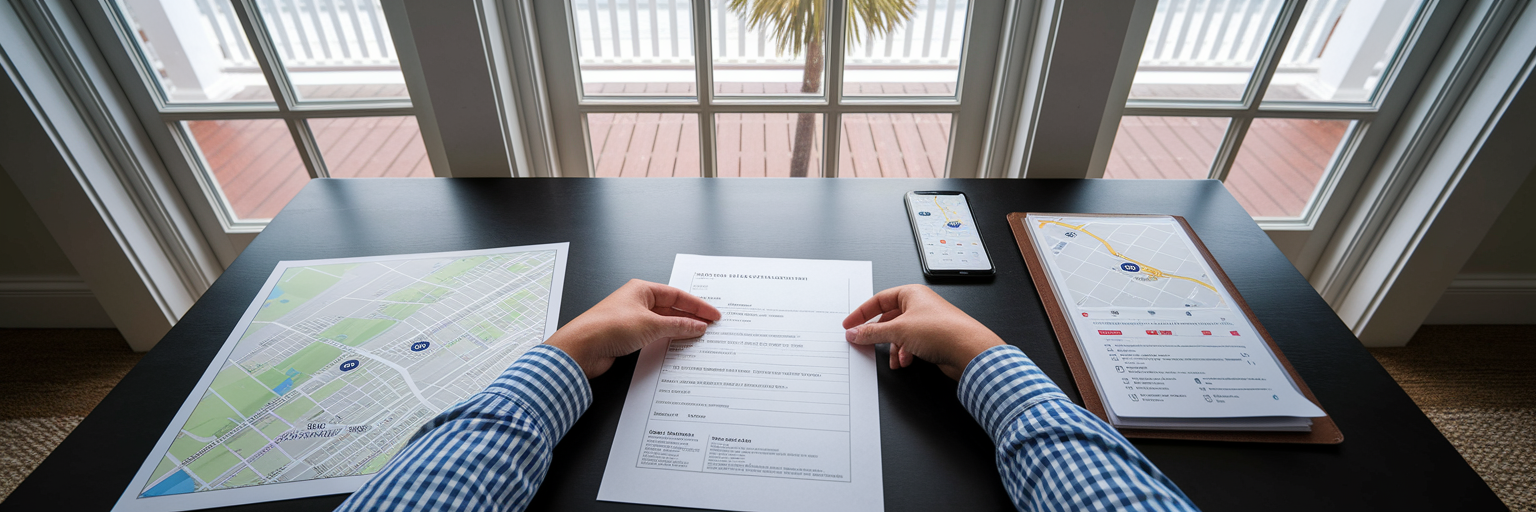Immediate Actions at the Accident Scene
The moments after a car crash are disorienting, especially on the busy, narrow streets of downtown Charleston. Amid the confusion, your first priority is to create a safe environment and document the scene. Taking a few clear, methodical steps can protect your health and your potential claim.
If you find yourself in this situation, focus on this simple checklist:
- Prioritize Safety. If possible, move your vehicle out of traffic. If you are a passenger or pedestrian, get to a sidewalk or safe area away from the road. Check yourself and others for injuries. Adrenaline can mask pain, so be thorough.
- Contact Authorities. Call 911 immediately. A police report provides an official record of the incident, and requesting medical assistance is crucial, even for what seem like minor injuries.
- Exchange Information. Collect the driver’s name, contact details, license plate number, and insurance information. Crucially, you must confirm their rideshare status. Ask directly: “Were you on an active trip for Uber or Lyft?” Knowing what to do after an Uber accident starts with this single question, as it determines which insurance policy applies.
Unique Complexities of a Rideshare Crash
An accident involving a rideshare vehicle is not like a typical car wreck. The involvement of a large corporation like Uber or Lyft introduces layers of complexity that can be confusing for anyone trying to recover damages. Understanding these challenges is the first step toward navigating them successfully.
The Problem of a Distracted Driver
Rideshare drivers are often managing more than just the road. They are interacting with an app, checking for ride requests, and following GPS directions. On Charleston’s intricate street grid, with its one-way roads and sudden stops for pedestrians and horse-drawn carriages, this app-based distraction can easily lead to a collision.
Layered Insurance Policies
Unlike a private driver with a single auto policy, a rideshare driver is covered by different insurance policies depending on their status in the app. Whether they were offline, waiting for a ride, or actively transporting a passenger completely changes who is financially responsible. This ambiguity is often used by insurance companies to delay or deny claims.
The Rideshare Company’s Role
When you are in a crash with a private citizen, you deal with their insurance company. In a rideshare accident Charleston SC, you are suddenly up against a multi-billion-dollar corporation and its team of lawyers. Their primary goal is to minimize their own liability. Navigating these issues can be difficult, which is why understanding the role of a Charleston car accident lawyer is so important.
Determining Liability Under South Carolina Law
The key to a successful rideshare accident claim is identifying the correct liable party, which depends entirely on the driver’s app status at the moment of the crash. South Carolina car accident laws have specific rules for Transportation Network Companies (TNCs) like Uber and Lyft, creating three distinct scenarios for insurance coverage.
Each scenario dictates which insurance policy is on the hook for damages. The difference between the driver being “available” and “on a trip” can mean the difference between a small policy and one worth over a million dollars. During an active trip, South Carolina law mandates that rideshare companies provide at least $1 million in liability coverage, a regulation that offers significant protection to injured parties, as highlighted in analyses like the one from 864LAW.com.
| Driver’s App Status | Applicable Insurance Policy | Typical Coverage Purpose |
|---|---|---|
| Offline (App is Off) | Driver’s Personal Auto Insurance | Covers the driver for personal use only; may deny commercial activity claims. |
| Available (Logged In, Waiting for a Ride) | Rideshare Company’s Contingent Liability | Applies if personal insurance denies the claim. Covers lower liability limits. |
| On a Trip (Accepted a Ride or with a Passenger) | Rideshare Company’s Full Commercial Policy | Provides at least $1 million in liability coverage for injuries and damages. |
Beyond insurance, South Carolina follows a modified comparative negligence rule. This means if you are found to be 51% or more at fault for the accident, you cannot recover any compensation. This makes proving the rideshare driver’s fault essential. Proving fault and navigating these insurance tiers is where the details of your claim are won or lost, a process that often requires the guidance of a seasoned Charleston personal injury lawyer.
Evidence Gathering in Downtown Charleston’s Environment
The process of gathering evidence car accident scenes require is unique in a historic city like Charleston. The environment itself can be a contributing factor, and documenting it properly can strengthen your claim significantly. Generic photos are not enough; you need to capture the full context of the scene.
Here are specific tips for collecting evidence in downtown Charleston:
- Document the Scene Thoroughly. Take wide-angle photos to show the entire intersection or street, medium shots of the vehicles’ positions, and close-ups of the damage, license plates, and any debris on the road.
- Capture Charleston-Specific Factors. Was the crash on a narrow, one-way street in the French Quarter? Were the cobblestones on Chalmers Street slick with rain? Did poor lighting in a historic alley play a role? Photograph these conditions. High pedestrian traffic near the City Market or temporary construction can also be critical factors.
- Identify Witnesses Immediately. Downtown Charleston is full of tourists. A witness from out of town may be leaving the next day. Get their name, phone number, and email on the spot before they disappear.
- Preserve Digital Evidence. This is perhaps the most important piece of evidence. If you were a passenger, take a screenshot of your ride in the Uber or Lyft app. This image is definitive proof of the driver’s status, which is essential for determining which insurance policy applies.
Navigating the Insurance and Claims Process
After the immediate aftermath, you will begin the process of dealing with insurance companies and the rideshare corporation. This stage requires caution and a clear understanding of your rights. The goal of adjusters is to resolve the claim for as little as possible, so how you communicate is critical.
The first step is officially filing a claim against Lyft or Uber. This is typically done through the “Help” or “Your Trips” section of the app. Report the accident and provide the basic details. This action formally notifies the company and triggers their claims process.
When an insurance adjuster contacts you, remember to stick to the facts. Do not speculate on what happened or apologize. Politely decline to give a recorded statement until you have sought legal advice. These statements can be used against you later. It is also important to understand what you can claim. Potential compensation may include:
- Medical bills and future treatment costs
- Lost wages from time off work
- Vehicle repair or replacement costs
- Pain and suffering
If you have questions about the claims process, do not hesitate to reach out for guidance.
Protecting Your Rights and Seeking Legal Help
Time is a critical factor after a rideshare accident. In South Carolina, you generally have three years from the date of the accident to file a personal injury lawsuit. This is known as the statute of limitations. While it seems like a long time, building a strong case takes time, so it is vital to act promptly.
A Charleston car accident lawyer provides more than just legal representation; they offer expertise in a very specific type of case. They understand the layered insurance policies, know the tactics used by large corporations to deny responsibility, and can build a compelling case using local knowledge of Charleston’s unique environment.
The path to fair compensation after a rideshare accident can be complex, but you do not have to walk it alone. By taking the right steps, you can secure your rights and work towards a just outcome. The attorneys at Roden Law are here to help you navigate every step of the way.


